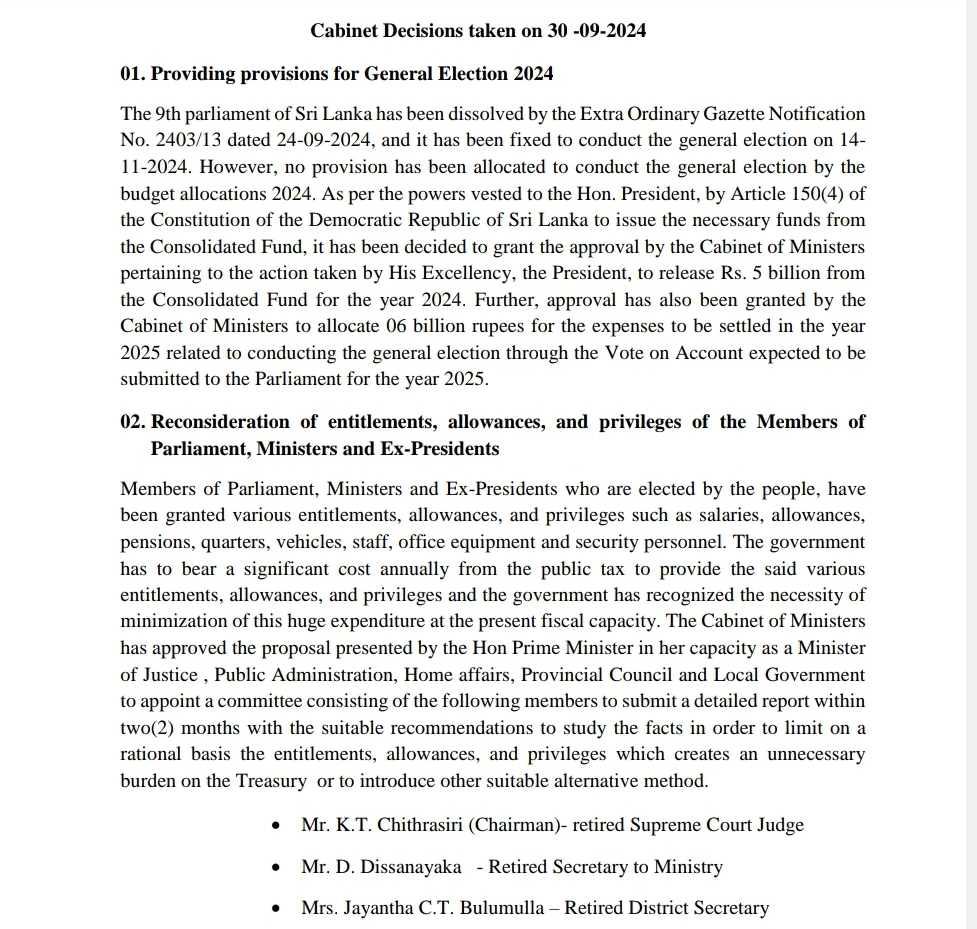Discover the key decisions from President Anura Kumara Dissanayake’s first cabinet meeting, including election funding and a review of MP privileges.
The political landscape of Sri Lanka has entered a new phase with the election of President Anura Kumara Dissanayake (AKD). His first cabinet meeting, held on 30th September 2024, provided significant insight into the direction his government will take. Two pivotal decisions were made during the meeting, signaling a strong commitment to public accountability and democratic processes
Background on AKD’s Presidency
Anura Kumara Dissanayake, a prominent leader from the Janatha Vimukthi Peramuna (JVP), was elected as Sri Lanka’s new President after a hard-fought campaign. His platform focused on anti-corruption measures, transparency, and accountability. The country is facing economic challenges, and citizens are looking to AKD to bring about meaningful reforms.
Focus on First Cabinet Meeting
On 30th September 2024, AKD convened his first cabinet meeting to tackle immediate governance issues. Two landmark decisions were made, which reflect the government’s priorities. These decisions covered electoral preparations and the review of privileges afforded to Members of Parliament (MPs) and former Presidents.

Funding the 2024 Parliamentary Elections
The Decision to Allocate 5 Billion Rupees
In preparation for the 2024 Parliamentary elections, the first decision of the new cabinet was to allocate 5 billion rupees for the election process. This allocation is essential to ensure that the elections, scheduled for 14th November 2024, are conducted smoothly and without delay.
Additional Budget of 6 Billion in 2025
In addition to the 5 billion rupees, the cabinet also approved an additional allocation of 6 billion rupees from the 2025 national budget. This will cover any outstanding expenses that arise from the election process, ensuring that the transition of power is completed without financial hindrance.
Ensuring a Smooth Election Process
Cabinet spokesperson, Minister Vijitha Herath, emphasized that the overall cost of the election is estimated at 11 billion rupees. The goal is to facilitate a transparent and efficient electoral process that will uphold the principles of democracy.
Cost Implications of the Election
Impact on the National Budget
Allocating such a large sum for the elections has raised concerns among some quarters. Sri Lanka’s economy is still recovering from the challenges of recent years, and this expenditure represents a significant financial commitment. The funds are expected to be drawn from the Consolidated Fund.
Public Concerns Over Election Costs
While elections are a vital part of any democracy, there are growing public concerns over the high costs involved. However, the government has assured the public that the funds will be managed efficiently, and the democratic process remains a priority.
Reviewing Privileges of MPs and Ex-Presidents
The Rationale Behind the Decision
The second major decision taken at AKD’s first cabinet meeting was to review the privileges and entitlements of current and former MPs and Presidents. These include salaries, allowances, pensions, vehicles, and other benefits. The government recognized the need to minimize excessive spending, particularly during a period of fiscal constraint.
Appointment of a Special Committee
To address this, the cabinet approved the formation of a committee to investigate and propose reforms. The committee, led by Mr. K.T. Chithrasiri, a retired Supreme Court Judge, will review all privileges currently enjoyed by MPs and ex-Presidents. Other members include Mr. D. Dissanayaka (Retired Secretary to the Ministry) and Mrs. Jayantha C.T. Bulumulla (Retired District Secretary).
Goals of the Committee
The committee’s primary task is to determine which entitlements are necessary and which can be reduced or eliminated. They will report back to the cabinet within two months, recommending ways to rationalize entitlements. This decision aims to reduce unnecessary financial burdens on the Treasury.
Financial Burdens of Privileges and Allowances
The Strain on Public Finances
Currently, the entitlements of MPs and ex-Presidents represent a significant strain on Sri Lanka’s public finances. Maintaining these benefits while addressing the country’s other pressing needs is becoming increasingly difficult, and the government has recognized the need for change.
Possible Outcomes of the Review
The review may result in cuts to certain allowances, particularly those seen as extravagant or unnecessary. Reducing these costs will not only save public funds but also send a strong message about the government’s commitment to responsible governance.
Implications for Sri Lanka’s Political Future
A Step Towards Transparency
These two decisions reflect AKD’s broader agenda for transparency and fiscal responsibility. By addressing both the cost of elections and the privileges of elected officials, his government is setting a tone of accountability from the very beginning.
AKD’s Vision for Fair Governance
Anura Kumara Dissanayake’s first cabinet meeting marks the start of what could be a transformative period in Sri Lankan politics. His emphasis on fair governance and reducing unnecessary government expenditure shows a clear intent to prioritize the public good over political privilege.
Conclusion
Anura Kumara Dissanayake’s government has set the stage for significant changes in Sri Lanka’s governance. The decisions made in the first cabinet meeting reflect a commitment to transparency, efficient use of public funds, and strengthening the country’s democratic processes. As the government continues to address these and other challenges, the public will be closely watching to see how these early decisions shape the nation’s future.
FAQs
- What were the two main decisions made in AKD’s first cabinet meeting?
The cabinet approved funds for the 2024 Parliamentary elections and appointed a committee to review the privileges of MPs and ex-Presidents. - How much money has been allocated for the elections?
A total of 11 billion rupees, with 5 billion allocated for 2024 and 6 billion from the 2025 national budget. - Why is the government reviewing the privileges of MPs and ex-Presidents?
The government aims to reduce unnecessary financial burdens and rationalize entitlements to save public funds. - Who is leading the committee for the privilege review?
The committee is chaired by Mr. K.T. Chithrasiri, a retired Supreme Court Judge. - What is the overall goal of AKD’s new government?
The government aims to bring transparency, reduce government spending, and ensure democratic processes run smoothly.